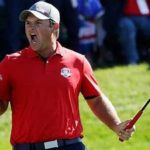The curtain has settled on the command performance that was the 2018 Masters Golf Tournament. Like all great works of theater, this year’s rendition lived up to its billing with drama, hope, failure, pain, and heartbreak. At its conclusion, Patrick Reed, a hometown boy who led nearby Augusta State College to two NCAA national titles and became the latest Augusta native to claim the title since Larry Mize won the green jacket in 1987. Reed wins his first professional major with rounds of 69-66-67-71, 15 under par by holding off Ricky Fowler by a stroke and fast charging Jordan Spieth, by two. As always, the tournament billed as Golf’s “annual rite of spring,” did not disappoint as dreams were shattered or fulfilled on the back nine at “Sunday at the Masters.”
Prologue
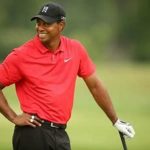 The week started with the frenzied anticipation of Tiger Woods return to Major Championship golf. Sidelined for over two years with personal and health issues, Tiger has shown glimpses of his immense talent as he is again competing on the PGA tour full time. His return gives golf fans around the world added motivation to watch maybe the greatest player of all time, compete against the best of the younger generation who came of age during his glory years. Tiger has always moved the excitement needle, and pre-tournament hype speculated endlessly on how he would perform in this his latest pursuit of golf immortality.
The week started with the frenzied anticipation of Tiger Woods return to Major Championship golf. Sidelined for over two years with personal and health issues, Tiger has shown glimpses of his immense talent as he is again competing on the PGA tour full time. His return gives golf fans around the world added motivation to watch maybe the greatest player of all time, compete against the best of the younger generation who came of age during his glory years. Tiger has always moved the excitement needle, and pre-tournament hype speculated endlessly on how he would perform in this his latest pursuit of golf immortality.
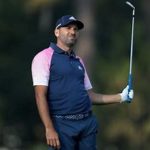 Sergio Garcia was also in the news. As the reigning Masters Champion, having shed the label of “best player to have never won a major” he arrived at Augusta as a recently married, softer, kinder persona that replaced his edgy and sometimes whiny attitude that turned off golf fans around the world. His return to Augusta as an admired defending champion in the mold of fellow countrymen, Seve Ballesteros and Jose Maria Olazabal would be short-lived as he stormed and stumbled his way to rounds of 81-78 and missed the cut.
Sergio Garcia was also in the news. As the reigning Masters Champion, having shed the label of “best player to have never won a major” he arrived at Augusta as a recently married, softer, kinder persona that replaced his edgy and sometimes whiny attitude that turned off golf fans around the world. His return to Augusta as an admired defending champion in the mold of fellow countrymen, Seve Ballesteros and Jose Maria Olazabal would be short-lived as he stormed and stumbled his way to rounds of 81-78 and missed the cut.
Rory McIlroy, Jordan Spieth, and Phil Mickelson were also in the news, albeit for their past failures in the major championships. Each  needing just one more win on their respective resumes to claim membership in the exclusive “Grand Slam Club” of Professional golf’s four major championships. Rory was first up needing only this year’s Masters. Phil Mickelson, seeking to become the oldest Major champion at 47, will try for the US Open scheduled at Shinnecock Hills in early June and Jordan Spieth needs the PGA Championship at Bellerive Country Club outside Saint Louis, Missouri. The future, past and present, of golfs ruling class, all trying to add one last accolade as they cement their way into the Hall of Fame.
needing just one more win on their respective resumes to claim membership in the exclusive “Grand Slam Club” of Professional golf’s four major championships. Rory was first up needing only this year’s Masters. Phil Mickelson, seeking to become the oldest Major champion at 47, will try for the US Open scheduled at Shinnecock Hills in early June and Jordan Spieth needs the PGA Championship at Bellerive Country Club outside Saint Louis, Missouri. The future, past and present, of golfs ruling class, all trying to add one last accolade as they cement their way into the Hall of Fame.
Act I Scene I
With all high drama, the foretelling of the first act often belies the tragedy, joy, and triumph of the closing scenes. As the 82nd edition of the Masters began, the storylines heralded at the start of the week, and there were many, all fell by the wayside. The players took their places, acting out out their roles in real time, as the scenes played out amidst the rolling hills and majestic scenery of the Augusta National Golf Club, the worlds most significant golfing stage. The ensuing production covered all the bases as it lifted our spirits, disappointed our expectations, enthralled our passions and captured our hearts with a majesty that belied the inevitable heartbreaks of any performance. In the end, there can only be one champion.
Tiger opened with rounds of 73-75 and seemed lost on the super-slick greens that brand the National. Phil Mickelson, showing his age, was inconsistent as he shoots 70-79 to make the cut barely. Rory McIlroy opened with 69-71, keeping his dreams of a Masters title alive. But it was Jordan Spieth, the heir apparent for golf’s superstar status, who steals the show with a six-under-par 66 to take the lead over perennial top-ten finisher, Matt Kuchar and Salt Lake City native, Tony Finau who shared four-under par 68’s.
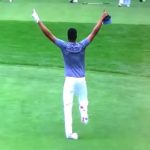 Finau made news after, celebrating a hole-in-one at Wednesday’s Par-3 contest, dislocated his ankle, putting his first Master’s performance in jeopardy. With grit and fortitude that characterizes his Pacific Island heritage and a heavily wrapped left ankle, he wowed the multitudes with a gutty performance which included a closing 66 on Sunday giving him a top-ten finish and a return invite to the 2019 tournament.
Finau made news after, celebrating a hole-in-one at Wednesday’s Par-3 contest, dislocated his ankle, putting his first Master’s performance in jeopardy. With grit and fortitude that characterizes his Pacific Island heritage and a heavily wrapped left ankle, he wowed the multitudes with a gutty performance which included a closing 66 on Sunday giving him a top-ten finish and a return invite to the 2019 tournament.
I had a chance to ask Tony about his ankle injury. Listen now as he tells me how he knew how to put it back in place.
Prowling in the shadows of the leaders at three-under par 69’s were Rory McIlroy, Henrik Stenson, Charlie Hoffman and Patrick Reed. In all, twenty-eight players finish round one at par or better.
Act I Scene II
Friday morning dawned bright and cool with swirling winds holding steady at 10-15 miles per hour. Whispering gently amongst the stately cathedral pines that line the generous fairways of the Augusta National, the breeze would provide a tough defense for the world’s best players. Changing direction on a moment’s notice and bedeviling even the savviest of contestants. It will provide a difficult test for pretenders to the crown.
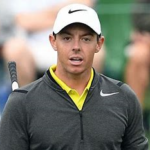 The first-day leader, Jordan Spieth struggled all day and finished with a two-over 74, as did Tony Finau. Kuchar went for 75. Only Patrick Reed, Henrik Stenson, and Rory McIlroy followed up their first round’s success with good scores with Reed leading the way with the day’s best round, a six under par, 66.
The first-day leader, Jordan Spieth struggled all day and finished with a two-over 74, as did Tony Finau. Kuchar went for 75. Only Patrick Reed, Henrik Stenson, and Rory McIlroy followed up their first round’s success with good scores with Reed leading the way with the day’s best round, a six under par, 66.
With the winds playing havoc throughout the round only twenty-two players finished at par or better, and only one player finished with two rounds in the sixties. Patrick Reed, the leader at nine under par.
Listen now as Patrick Reed talks about his childhood dream of winning the Masters and how the media picked Rory McIlroy over him to win.
As the curtain falls on the first act, thirty-four players have missed the cut and have exited the theater, their audition cut short by the exacting demands of golf’s grandest stage. Their hopes, dreams, and prayers cut short by the harsh reality that stardom is reserved for only a chosen few.
Act II
Saturdays second act begins wet, cool and overcast with an impending thundershower that looms in the wings bullying and frightening players and tournament officials alike. With Mother Nature’s relentless presence threatening to derail the day’s production, all involved share an ominous start to a day filled with so much promise. Saturday is billed as moving day on the PGA Tour and for a good reason. The closer a player can migrate to the front of the pack after Saturdays round, the better his chances are on Sunday afternoon. Nowhere is this fact more prevalent than at the Masters. Never, going back almost thirty years has the winner been outside a final couple of groups and gone on to win the tournament. Nick Faldo was the last, coming from behind with a final round 65, in 1989, to beat Scott Hoch in a playoff for the first of his three Green Jackets.
But the golfing gods were played for fools. Mother Nature tricked them all and Saturdays scores, fueled by placid pin positions, rain-softened greens and aggressive play by competitors racing to finish before the anticipated thunder and lightning, led to historical scoring for a Masters third-round. The field’s average score of 71.264 on Saturday was the second lowest on record and when taken in to account the course renovations including the lengthening of the course in 2002, the lowest average in recent history.
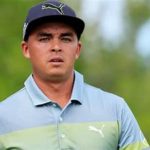 Almost everyone in the cast got in on the party as thirty-seven of the fifty-six players left in the field, equaling or bettering par. Rory McIlory’s 65, tying the low round of the day, was matched by Ricky Fowler and Spain’s Jon Rahm. Patrick Reed shot 67 to lead the field at fourteen under par and the only competitor to shoot in the sixty’s the first three days. An interesting side note, no player in the history of the Masters, has shot in the sixty’s all four rounds. With a three-shot lead over the field, Patrick Reed is staring history dead in the face and controls his fate. Shoot a low round in the sixties on Sunday, and the green jacket is his for the taking. The curtain falls on Act Two with history’s bright lights glowing brightly on the few actors left who will remember their lines, chase history and finish their final scenes.
Almost everyone in the cast got in on the party as thirty-seven of the fifty-six players left in the field, equaling or bettering par. Rory McIlory’s 65, tying the low round of the day, was matched by Ricky Fowler and Spain’s Jon Rahm. Patrick Reed shot 67 to lead the field at fourteen under par and the only competitor to shoot in the sixty’s the first three days. An interesting side note, no player in the history of the Masters, has shot in the sixty’s all four rounds. With a three-shot lead over the field, Patrick Reed is staring history dead in the face and controls his fate. Shoot a low round in the sixties on Sunday, and the green jacket is his for the taking. The curtain falls on Act Two with history’s bright lights glowing brightly on the few actors left who will remember their lines, chase history and finish their final scenes.
Act III
“Sunday at the Masters,” a refrain as familiar as the best lines in all the entertainment world begins under picture-perfect skies, warm temperatures and a promise of the magnificence that players, family, sponsors, and patrons expect when they make the pilgrimage to the holy grail of golf. With the world watching, the Augusta National Golf Club will not disappoint.
Eighty-six of the world’s greatest players entered Magnolia Lane on Sunday morning with the highest of expectations. That number is reduced to just a few and, if history is the guideline, realistically only two. The Sunday final pairing almost always produces the Masters champion. Adding intrigue to the drama played out on a gorgeous Sunday afternoon, on the world’s biggest sporting stage, is the members of that pairing, Rory McIlroy, and Patrick Reed, have a history going back to the Ryder Cup. In an epic contest, they famously went head to head in one of the most dramatic showdowns in recent history. It was this pivotal match, where he reigned supreme against McIlroy, that ordained Reed his nickname of “Captain America” for his feistiness in singles play. The world awaited a re-match, the scene was set, and history watched which player would rise to the occasion?
The plot lines were as simple as they are convoluted, would Patrick Reed fulfill his brash statement that “he is one of the top five players in the world” and win his first major title. Or would Rory McIlroy exercise the demons of his monumental collapse on the back nine of the 2011 Masters that has denied his claiming the “Grand Slam.” The audience surrounding the first tee and lining the fairways and greens, made their preference known early and often. Rory McIlroy was the apparent favorite to the point of embarrassment. Mostly silent when Patrick played, the crowd was boisterous, loud and exuberantly behind McIlroy on every shot, chip and putt.
Listen to Patrick Reed talk about the crowds reaction to Rory McIlroy on the first tee and how it took the pressure off him.
Shakespeare famously asked: “Who are we, what are we, why are we?” And Patrick Reed responded with steady play that emphatically answered the ancient bard’s questions and used the crowd’s emotions to his advantage. He would finish with a one-under-par 71, to end the tournament at fifteen under par, which was good enough to win. Rory would struggle all day, finishing with a two-over-par 74 and once again failing in his pursuit of the grand slam.
With Rory falling to the wayside, it was left for Jordan Spieth to answer the siren call of ghosts and legends past, lurking amongst the magnolias, dogwoods, and azaleas that surrounded Raes Creek and Amen Corner. Attempting the greatest comeback in Masters history, he responded with, not only the low round of the tournament but the lowest final round in Masters history, an eight-under-par 64. With galleries swelling after each magnificent shot and long putt made, while voicing their approval with roars that soared above the majesty of the back nine, Spieth provided the fireworks for which Masters Sunday is famous. His only mistake was a mis-hit bogey on eighteen, spoiling his journey to overtake Reed and win the title. A birdie on the final hole would have tied Reed for the Championship and, with a 62, claim the lowest final round in Major Championship history. He finished third at thirteen–under par.
Ricky Fowler, playing in the next-to-last group, just ahead of Reed and McIlroy, was the next man up to provide the drama for which the tournament rightfully deserves its place in sporting lore. Responding to every test, answering every challenge, including birdieing the 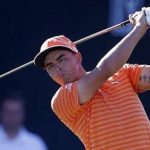 eighteenth hole, finishing with a five-under-par 67, he was the last to threaten Reed, taking second alone. With Reed, Fowler, and Speith finishing 1-2-3, this would be the first Masters since 2001 with Americans claiming the top three spots.
eighteenth hole, finishing with a five-under-par 67, he was the last to threaten Reed, taking second alone. With Reed, Fowler, and Speith finishing 1-2-3, this would be the first Masters since 2001 with Americans claiming the top three spots.
In the end, as the curtain fell, it was Patrick Reed who snatched the trophy away from the favorites. He did not dominate or lead in any significant statistical category, (i.e., Driving Distance, Greens in Regulation, Fairways Hit, etc.) What he did do well, was play with a steely and steady determination and putt well, His physical play was coupled with an absolute belief in his will to triumph, no matter the sentiments of the unresponsive and aloof gallery that surrounded his every shot. Ignoring all the negative forces arrayed against him, he would lead the field in the number of birdies, (22) eagles, (2) and had five fewer putts than any other player. That was enough to win, but at what cost? The first prize of $1,980,000 will spend, as the saying goes, but will not buy him, the love or affection of the crowds. He shoulders a green jacket but not the respect of his peers. He plies his trade in front of millions, but the platitudes are reserved for others. Patrick Reed is at best, a polarizing figure with a me-first mentality, an attitude that will never transcend into widespread popularity, regardless of personal achievements.
Epilogue
At the final curtain, I offer my subdued reflections and review of the closing acts. In all my years of covering this tournament, I have never seen a more somber reaction to a winner, especially one who played as brilliant as Reed and has a hometown identity. In a previous story I wrote about the Masters, I offered these glowing terms, “In a world fraught with commotion and diminished expectations, the Masters never disappoints. The experience of attending the Masters has always been beyond the expectancy regardless of how grandiose those expectations are.” Sadly, this is no longer true.
Reed was, and is, an unpopular champion and the reception of the crowds that tracked his pairing with McIlroy and the ceremony that followed, was muted and restrained by any meaningful standards. The reasons are many and well known among the local population and people who know him best. Those imperfections, hidden for so long, are now being manifested on a national and international platform and are being magnified by his success on this much larger stage. A tragic hero, he is estranged from his family and has a long history of failed relationships with acquaintances, teammates, sponsors and fellow professionals. Accusations still linger about cheating, lying, being dismissed from his college team for unanswered allegations and general untruthfulness. His outspokenness, brashness, and sense of entitlement have led to his alienation from the public, media, and his fellow competitors.
Patrick Reed talks about his lack of regret for his past statements about being one of the best players in the world. Listen Now.
I distinctly remember, when Reed first appeared on the national radar, leading the upstart Division II, Augusta State Jaguars, to not one, but two NCAA National Championships, an unheard-of achievement. Wanting to know more about this phenomenal player who did not lose an individual match in two years of college golf, I called a good friend with close ties to the Augusta State Athletic Department for the inside scoop. To my surprise, he was very guarded and sparse in his praise. Only after much prodding did he reveal the character flaws, personal failures, shortcomings and imperfections that Reed, even at that young age, still manifests to this day.
Final Review
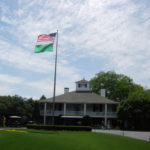 As I write this review, my conclusions are two-fold. The first is this: The Masters is and will remain the pre-imminent sporting production in the world. The magnificence of the golf course, the unmistakable excellence of the competition and the many time-honored traditions all seam together providing a breathtaking spectacle of immeasurable joy and achievement. The tournament will continue to provide the glorious, much-anticipated rite of spring that transcends the commonplace world that surrounds it.
As I write this review, my conclusions are two-fold. The first is this: The Masters is and will remain the pre-imminent sporting production in the world. The magnificence of the golf course, the unmistakable excellence of the competition and the many time-honored traditions all seam together providing a breathtaking spectacle of immeasurable joy and achievement. The tournament will continue to provide the glorious, much-anticipated rite of spring that transcends the commonplace world that surrounds it.
My second reflection is this year’s champion Patrick Reed, is an incredibly immense talent fused with a tragically flawed human being existing on the scale of a Shakespearean protagonist in what seems to be an epic tragedy in the making. It remains for history to record if the bright and sometimes harsh glare of international celebrity diminishes or enhances the vitriol his past has generated when coupled with the success of his recent accomplishments. There are many reasons he is not well liked or respected as a human being. Only the future will determine if the labels he has earned in his past, are embedded on his soul with indelible ink or are scrubbed away with the sands of time.
At the Masters, I’m Jeff Waters
Jeff Waters is a PGA Master Professional and a member of the Golf Writers Association of America

